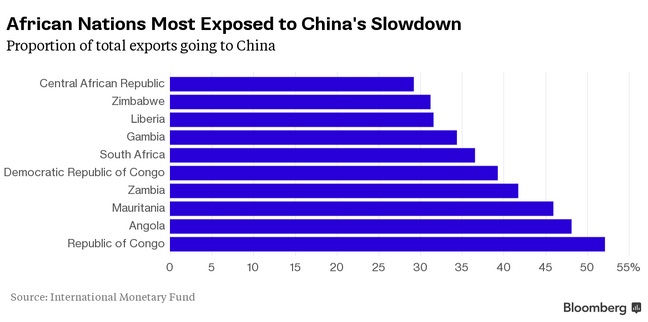News
These are the African nations most exposed to China’s slump

China’s slowdown is rippling across Africa and these three nations are the most exposed, relying on demand from the Asian economy for almost half their exports: Republic of Congo, Angola and Mauritania.
Oil accounts for the bulk of Angola’s and Congo’s exports, damaging their prospects after crude prices plunged 55 percent since the beginning of June last year to below $50 a barrel. The price of iron ore, which makes up more than 40 percent of Mauritania’s exports, has dropped by almost a third in the past year. The three nations each shipped more than 45 percent of their exports in 2014 to China, data from the International Monetary Fund shows.
“For countries like Angola, which basically only has one commodity, there is a huge knock when prices fall and less oil is being exported to China,” Christie Viljoen, an economist at NKC African Economics, said by phone from Paarl, outside Cape Town. “It’s a case of when things are good, it’s really good, but when it turns bad, it’s really bad.”

Angola, Africa’s second-largest oil producer after Nigeria, has been forced to devalue its currency twice since June and has slashed its budget by a quarter following a slump in revenue. Congo’s fiscal deficit almost doubled to 8.5 percent of gross domestic product in 2014 from the previous year and in May Finance Minister Gilbert Ondongo cut $500 million of spending from the 2015 budget to bring it down to $4.5 billion.
Reliance on a single commodity and exposure to one country for the bulk of exports is a double-whammy. China’s slowdown means weaker currencies and higher import prices for these African nations, which in turn feeds into more pressure on their exchange rates and a run down of central bank reserves, said Viljoen.
Domino Effect
“If you are at the top of the list in terms of dependence on China and your economy is not well diversified, there are a bunch of negative things which can fall like dominoes,” he said.
Angola’s kwanza has dropped 24 percent against the dollar this year and was trading at 135.86 on the interbank market as of 6 p.m. on Thursday in Luanda, the capital.
While South Africa is the continent’s single biggest exporter to China – with shipments totaling $45 billion in 2014 – its exports are more diversified and destined to a wider range of countries. China buys 37 percent of South Africa’s goods, followed by the European Union at 20 percent.
Commodities such as gold, platinum and iron ore still make up the bulk of exports at just over half, though vehicle shipments have grown in importance to reach 13 percent of the total, according to data from the South African Revenue Service.




